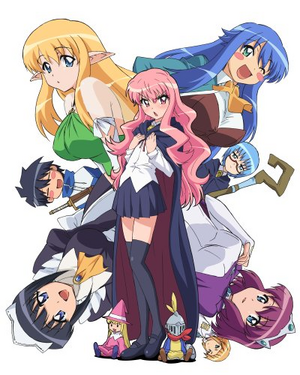
The Familiar of Zero, one of the classic "isekai" titles
Isekai (異世界, lit. "Another world", "Different world", or "Otherworld")[1] is a theme present in Japanese anime, manga and other media. It usually has to do with the main character being transported to another world, hence the name. Other worlds regard to parallel fictional universes or virtual worlds, unbeknownst to the protagonist of others around him/her.
In Japan, they don't recognize isekai as the same meaning as in the West, and generally separate it into "High Fantasy" (「ハイ・ファンタジー」, hai fantaji), "Transported to another world" (「異世界転移」, isekai ten'i), or "Reincarnated into another world" (「異世界転生」, isekai tensei).
Characteristics[]
The theme can be characterized as wish fulfilment, with the person being transported often being a NEET, hikikomori, gamer, or just a regular human. In the new fantasy world, they are able to succeed through their comparatively unimportant-in-real-life genre knowledge or other skills. In some cases like In Another World With My Smartphone, their power can range from tremendous magical abilities surpassing anyone else, to relatively weak, as in Re:Zero − Starting Life in Another World, where the protagonist does not gain any special power beyond the ability to survive death in a type of temporal loop.
In general, the "isekai" protagonist is usually regarded as the "chosen hero". But some titles subvert the theme such as Drifters, where people entering the other world are historical generals and other warriors who are more brutal than the world's inhabitants themselves. Titles like That Time I Got Reincarnated as a Slime, the protagonist starts off as non-human as a weak blob. Some stories involve people being reincarnated as unusual inanimate objects, like a magical onsen or a vending machine.
History[]
In earlier times, the genre started with titles like El-Hazard and Fushigi Yūgi, in which the protagonists retained their original appearance upon entering a different world. Later titles such as Saga of Tanya the Evil inverse the genre where the protagonist dies and reincarnates in a different world, such as Knight's & Magic, with the latter retaining their memories and interests from their previous life.
The .hack franchise was one of the first to present Virtual Reality as a parallel concept of isekai, with Sword Art Online following in its footsteps.
Genre variations[]
- These variations aren't univerally agreed upon, but can be a good way to distinguish between types...
- Summoning (「異世界転移」, isekai ten'i) - summoned to another world by some means
- Reincarnation (「異世界転生」, isekai tensei) - died and reincarnated (which might include resurrection as the same person or renicarnation as an object) in another world
- Translocation (「異世界転移」, isekai ten'i) - unknown means of getting to another world
- Virtual Reality (「バーチャル・リアリティ」, Bācharu Riariti) - going to a virtual version of another world, usually a video game world
- Other - some other means of getting to another world, like a portal
Reverse isekai[]
A very specific variation that is a twist on the general isekai type is the "reverse isekai" where charactrs come to the modern or present day world from another world. Some obvious specific examples are The Devil is a Part-Timer! (2013) and Gate - Thus the JSDF Fought There! (2015) where some kind of portal connects the worlds. However there are some that fall in a gray area like Re:Creators (2017) where the characters appear based on some magical or special power, but do come from some "other world".
Examples[]
Videos[]
References[]
External links[]
- News
- Anime News Network - 'Isekai' Transported Into the Oxford English Dictionary by Ken Iikura-Gross 2024-03-29 06:41 EDT
- MISLEADING: IGN - Isekai, the Popular Manga and Anime Genre, Is Now in the Oxford English Dictionary BY ISAIAH COLBERT | UPDATED: MAR 28, 2024 12:44 PM | POSTED: MAR 28, 2024 12:16 PM
- AnimeHunch - Isekai Stories Have No Originality, Says Gokudou-Kun Manyuuki Author By Ami Nazru April 5, 2023
- Anime News Network - Answerman What is the Villainess Isekai Trend Actually Parodying? by Kim Morrissy, Dec 9th 2022

